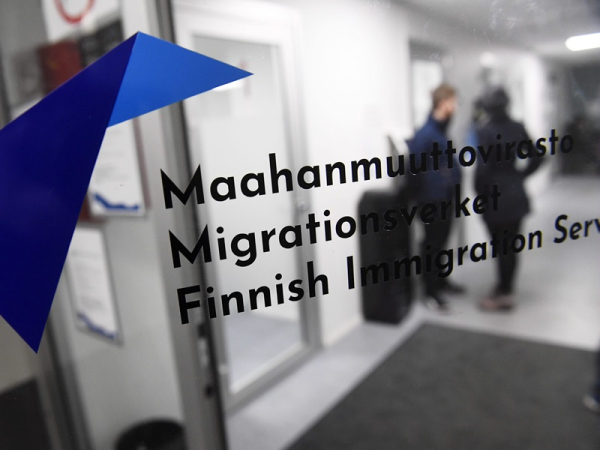
People inside a service point of the Finnish Immigration Service (Migri) in October 2019. Municipalities in Finland are set to take on the primary responsibility for organising integration services starting next year, at the same time as the central government is slashing funding for the services. (Vesa Moilanen – Lehtikuva)
- Next Article YLE: Weather in Finland to cool but remain warmer than usual
MUNICIPALITIES in Finland are scrambling prepare for the enactment of legislation that has them assume primary responsibility for organising integration services starting on 1 January 2025.
YLE on Sunday pointed out that the legislation enters into force at the same time as the government, as per its newly approved budget for next year, cuts budget appropriations for integration services by 58 million euros a year as part of an effort to close its chronic budget deficit.
Also other services for immigrants face cuts at the turn of the year, with the government deciding to save three million euros on the costs of interpretation services, for example.
This disconnect is at the heart of the criticism levelled at the decisions by the six largest cities in Finland: Helsinki, Espoo, Tampere, Vantaa, Oulu and Turku. Municipalities, they summarise, are forced to take on additional responsibilities in the areas of integration services, language instruction and immigrant counselling and guidance, and expected to perform them on a smaller budget.
“We have to offer language instruction on a broader basis than before. It means that immigrants will in the future be tested for their language skills in either Finnish or Swedish,” Mika Penttilä, the director of culture and education at the City of Oulu, stated to YLE.
The integration services act entering into force at the turn of the year will also reduce the computational compensation disbursed to municipalities and well-being services counties for organising services that support the integration of people of refugee backgrounds. The eligibility period for the compensation will be cut from four to three years for quota refugees and from three to two years for other refugees, including those granted temporary protection.
The Association of Finnish Local and Regional Authorities has warned that cutting the compensation could discourage municipalities from receiving refugees.
The revisions are an attempt to strengthen the public economy and encourage immigrants to take more responsibility for their integration.
Given the diversity of circumstances for immigrants, the objectives are challenging.
“There are immigrants who come here primarily for work or education. They have a different capacity and readiness to integrate than the segment of immigrants who maybe have difficulty reading and writing,” said Penttilä.
Immigrants in the latter group inevitably embark on the integration journey from a different starting point and face a longer path to working life, the public broadcasting company elaborated.
The economic impact has been questioned, too.
Glenn Gassen, the director of immigration at the City of Helsinki, reminded YLE that immigration has been a key driver of both employment growth in the 2000s and population growth in Helsinki. Integration services, he added, have been shown to be an effective way to boost employment and, as a result, tax revenue.
“We can’t leave people without services and expect that they’ll learn Finnish in front of a mirror at home. In Finland, it’s still very hard to find work without Finnish or Swedish skills,” he said.
Also Oulu has grown partly as a result of immigration. In 2023, immigrants accounted for two-thirds of the roughly 3,000 people who moved to the city.
“We’re aware that our working-age population isn’t growing, that the only growth is coming from immigration. We have to pay particular attention to the integration of immigrants as a society,” stressed Penttilä.
The government has similarly acknowledged that scaling down integration services would likely undermine the integration and employment of immigrants. The impact assessment published alongside the proposal drew attention to the risk that cuts in funding for integration services would in the long term lead to an increase in public spending and decrease in tax revenue.
Aleksi Teivainen – HT
- Next Article YLE: Weather in Finland to cool but remain warmer than usual
Source: www.helsinkitimes.fi
